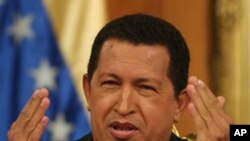The U.S. State Department said Wednesday Venezuelan President Hugo Chavez is subverting the will of the country's electorate by seeking emergency powers in advance of the seating of a new legislature next month. The current congress, filled with pro-Chavez members, is expected to approve rule-by-decree by the end of the week.
The State Department has joined opposition figures in Venezuela in criticizing the move by Chavez supporters to grant him emergency powers before a new congress, with more opposition members, is seated on January 5.
The current congress, with an overwhelming majority of pro-Chavez members, voted Tuesday to grant him special powers to enact laws by decree for the next year. The National Assembly is expected to give final approval to the measure by the end of the week.
Chavez critics say the action, which would be the fourth time in 12 years the populist president has been given temporary decree powers, is a clear effort to sideline the next congress, which will have enough opposition members to block such action.
State Department Spokesman P.J. Crowley said the action is contrary to the Inter-American Democratic Charter to which Venezuela is a signatory.
"He [Chavez] seems to be finding new and creative ways to justify autocratic powers," said P.J. Crowley. "What he is doing here, we believe, is subverting the will of the Venezuelan people. As the Inter-American Democratic Charter underscores, the separation of powers and the independence of the branches of government are an essential element of the representative democracy. An independent legislature has an essential role to play in the political system in order to meet the principles laid out in this charter."
In the September elections, the opposition drew about half the total vote and won more than one-third of the seats in the new congress, enough to deny Mr. Chavez the two-thirds majority needed to approve some laws, including decree powers.
Spokesman Crowley said the successful elections, which drew millions of people to the polls, allowed Venezuelans to send "a clear message" to the Chavez government.
He said the new legislature should have the ability to contribute to the country's political process.
Hundreds of Chavez opponents demonstrated outside the legislature Tuesday, objecting to planned decrees they said could impose restrictions on the internet and endanger Globovision, the country's last opposition television channel.
Chavez loyalists say he will use new decree powers to boost infrastructure projects and help the country recover from recent floods and mudslides that have left thousands homeless.
Mr. Chavez says all action contemplated will be within the framework of the Venezuelan constitution. He used past decree powers to nationalize privately-run oil fields, utilities and telecommunications companies.
US Says Chavez 'Subverting' Popular Will With Move to Rule by Decree








